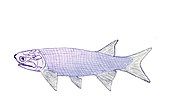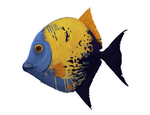Brookvalia
Appearance
| Brookvalia Temporal range:
| |
|---|---|

| |
| Specimen of B. gracilis | |
| Scientific classification | |
| Domain: | Eukaryota |
| Kingdom: | Animalia |
| Phylum: | Chordata |
| Class: | Actinopterygii |
| Order: | †Redfieldiiformes |
| Family: | †Brookvaliidae |
| Genus: | †Brookvalia Wade, 1933 |
| Synonyms | |
| |
Brookvalia is an extinct genus of prehistoric freshwater ray-finned fish that lived during the Middle Triassic epoch (Anisian stage).[2][1]
It contains four species, all known from the Hawkesbury Sandstone near Brookvale, New South Wales, Australia.[3][4]
- †B. gracilis Wade, 1933 (=B. parvisquamata Wade, 1933)
- †B. latipennis (Wade, 1935) (=Dictyopleurichthys latipennis Wade, 1935)
- †B. propennis Wade, 1933
- †B. spinosa (Wade, 1935) (=Beaconia spinosa Wade, 1935)
It was a member of the redfieldiiforms, a group of presumed basal neopterygians that were widespread during the Triassic.[5][6]
See also
[edit]References
[edit]- ^ a b Sepkoski, Jack (2002). "A compendium of fossil marine animal genera". Bulletins of American Paleontology. 364: 560. Archived from the original on 2009-02-20. Retrieved 2009-02-27.
- ^ "PBDB". paleobiodb.org. Retrieved 2024-04-02.
- ^ "The Triassic fishes of Brookvale, New South Wales / by R.T. Wade - Catalogue | National Library of Australia". catalogue.nla.gov.au. Retrieved 2024-04-02.
- ^ Hutchinson, Peter (1973). "A REVISION OF THE REDFIELDIIFORM AND PERLEIDIFORM FISHES FROM THE TRIASSIC OF BEKKERS KRAAL SOUTH AFRICA AND BROOKVALE NEW-SOUTH-WALES". Bulletin of the British Museum (Natural History) Geology. 22: 233––254.
- ^ "The anatomy and phylogenetic position of Helichthys, a redfieldiiform fish from the Triassic of South Africa | The Palaeontological Association". www.palass.org. Retrieved 2024-04-02.
- ^ Lombardo, Cristina (2013-11-01). "A new basal actinopterygian fish from the Late Ladinian of Monte San Giorgio (Canton Ticino, Switzerland)". Swiss Journal of Geosciences. 106 (2): 219–230. doi:10.1007/s00015-013-0125-9. ISSN 1661-8734.





